Text
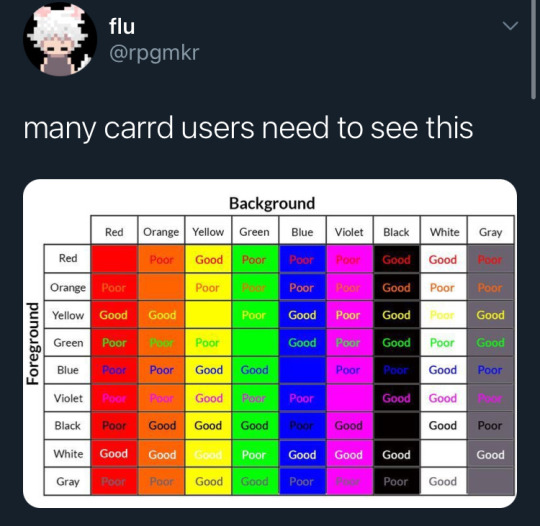
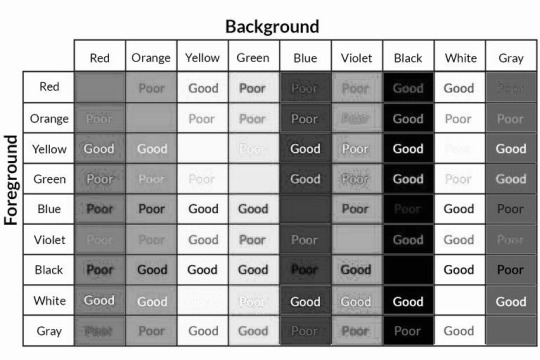
found these on twitter that might be helpful to all rpers who want to make sure their themes and carrds are accessible to all
93K notes
·
View notes
Text
Tumblr Tuesday: Farcille Fanart
Hello, Dungeon Meshi fans, but perhaps a particularly special hello to Farcille fans and artists. These two have really captured your imagination in a way that has us a little bit breathless. Here's a Farcille fanart collection for you.
(We had to be selective, but there is so much more. Please visit the #farcille fanart tag for the rest of the outpourings of genius.)
@bemp0:
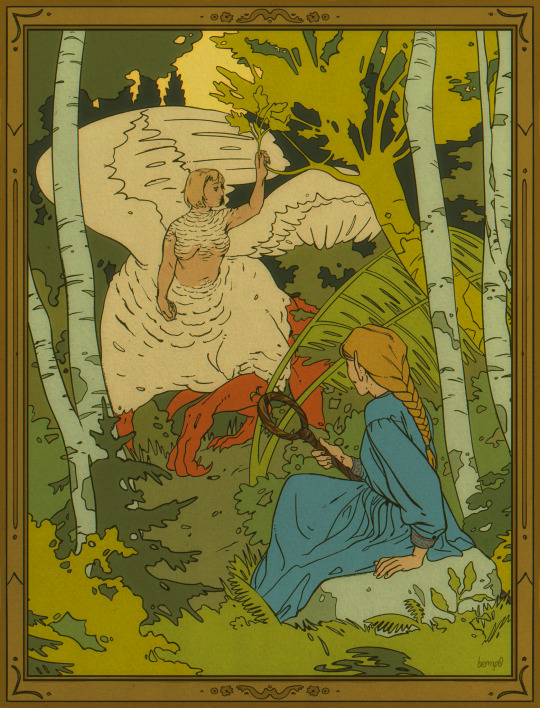
@mad-cosmos:

@a-paperboxgozilla:

@cerylune:
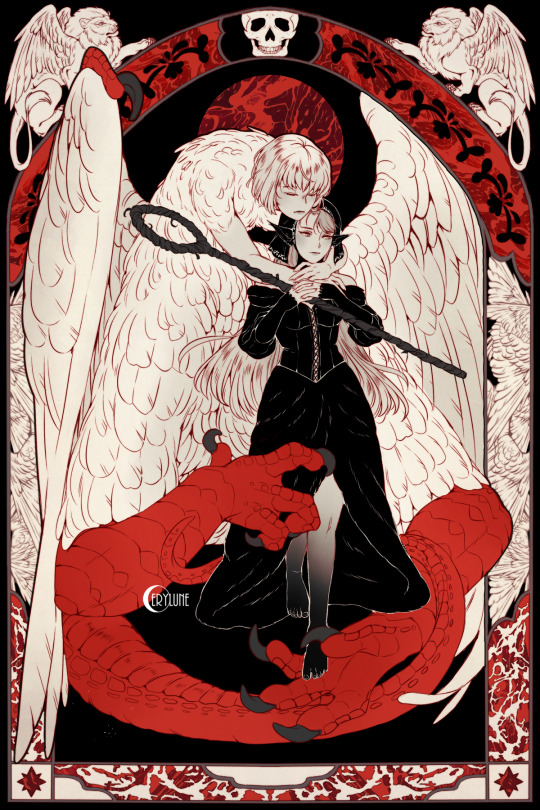
@madeleinefjall:

@teeceezhang:
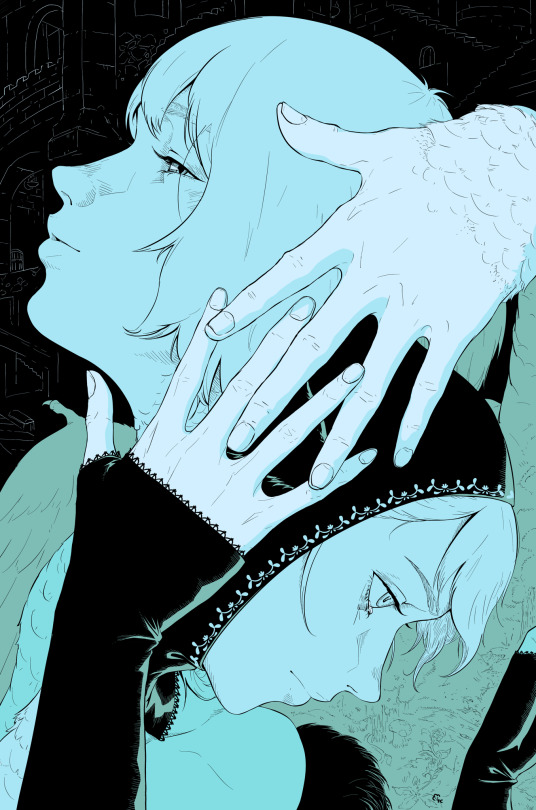
@sointuina:

@chumii1:

@fr0guu:

@nousanti:
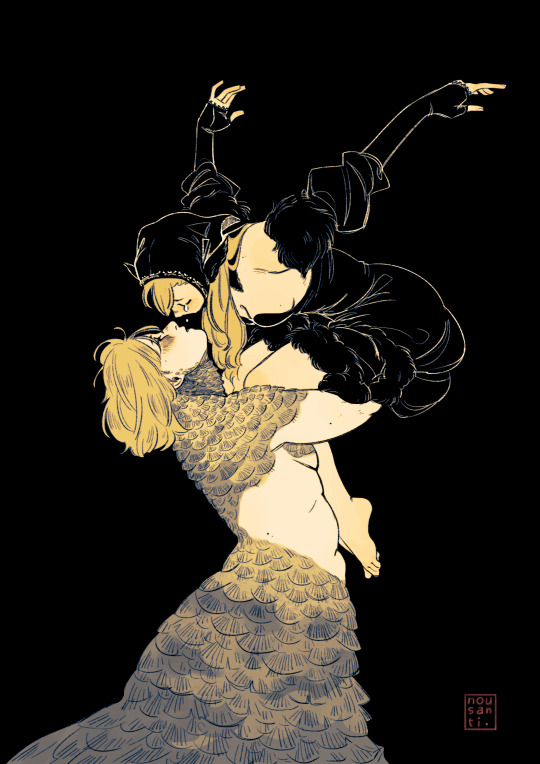
@mad-cosmos:

@pien-art:

@turnipoddity:

@alexpperkins:
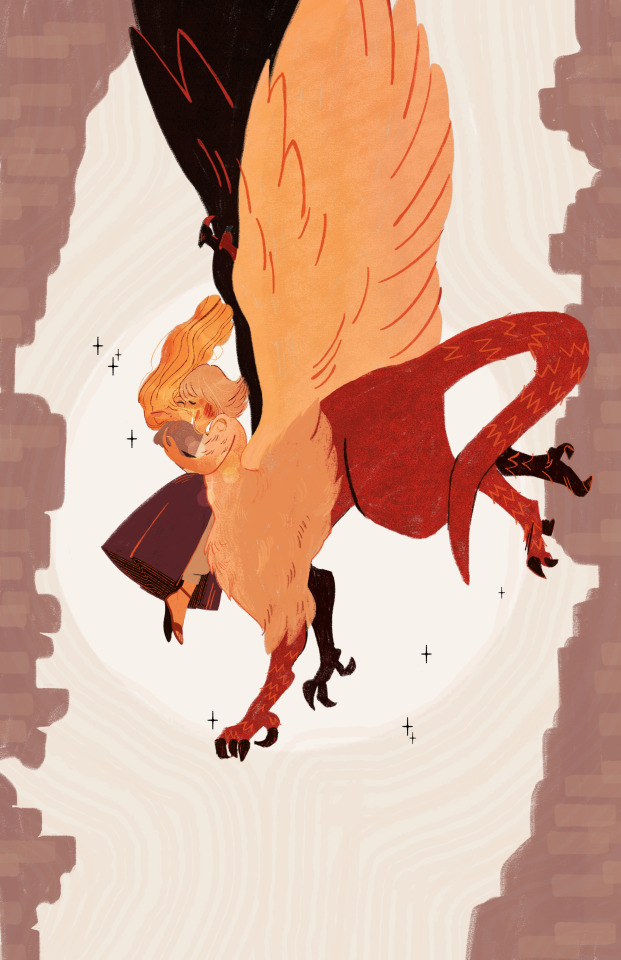
@vexiimoon:

@mgosketches:

4K notes
·
View notes
Text
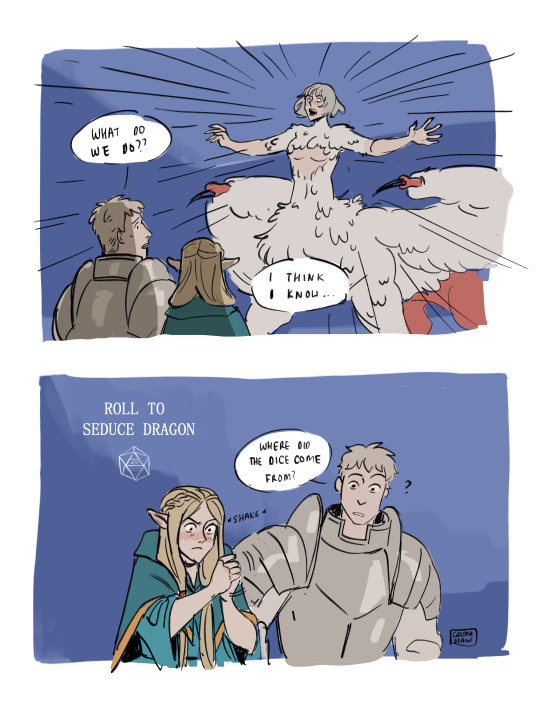
dungeon meshi but they try to solve problems the dnd way (marcille is shooting her shot)
31K notes
·
View notes
Photo
really needed the hyperfixation today. stating up until 2am was a bad idea.

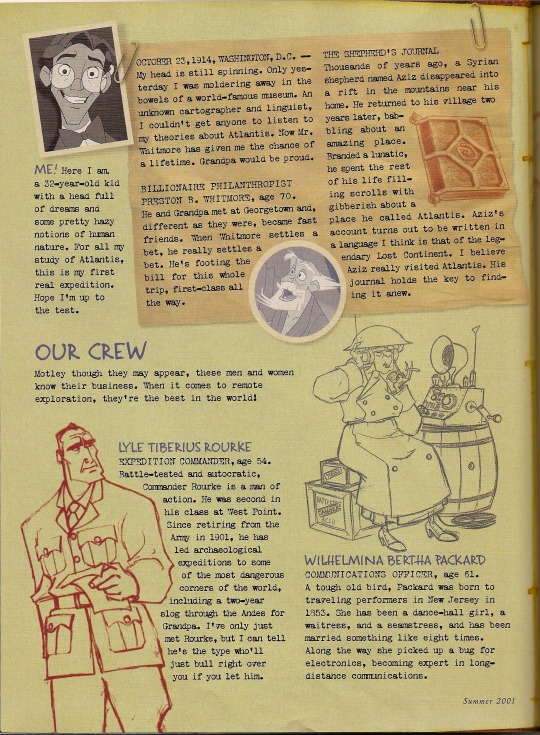
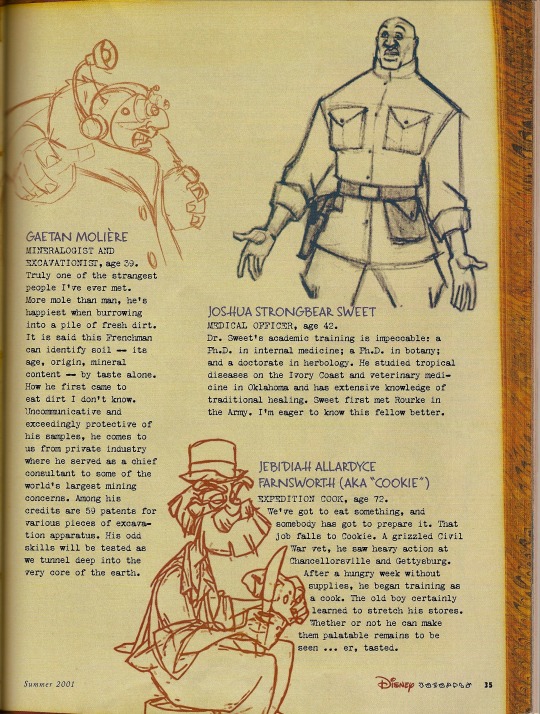
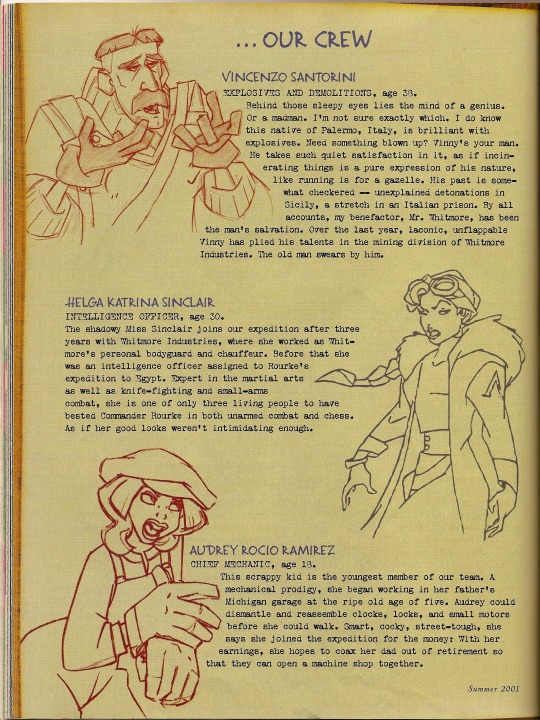


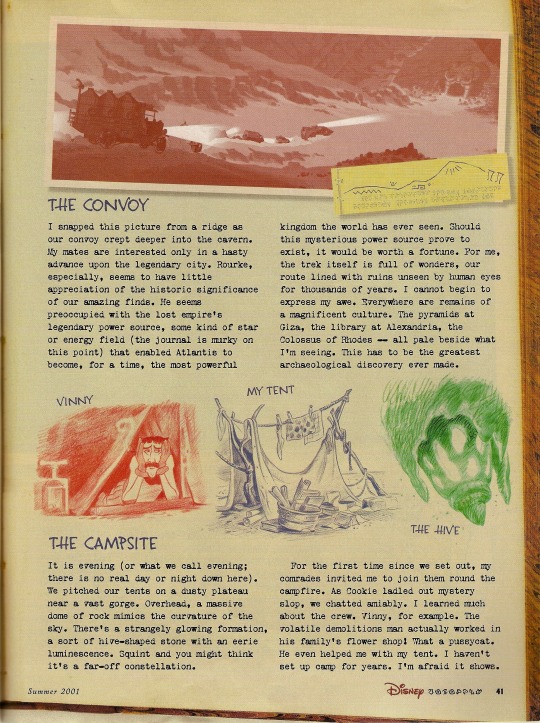
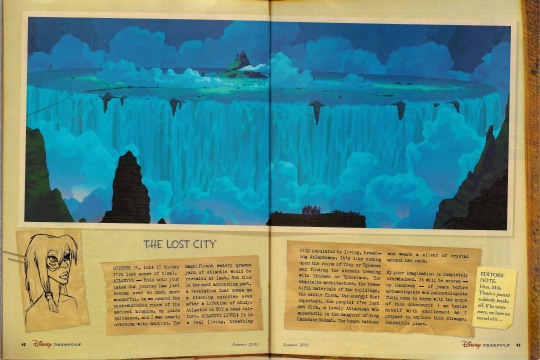
“Atlantis Found!”, Disney Magazine Summer 2001
The cover story for their Atlantis The Lost Empire issue, this article is pretty much excerpts from The Journal of Milo Thatch telling the story of the expedition, which I actually forgot ran throughout late October, starting on October 23rd, 1914 and arriving to Atlantis around the 26th. So it’s been about a month and a 100 years since the movie took place. I wish I caught this earlier.
Lot of production art was used for illustrating the book, so you got a bit of sampling from that here.
590 notes
·
View notes
Note
Someone mentioned that main characters can get overdeveloped. I'm familiar with characters being underdeveloped, but how do you tell if they are overdeveloped?
5 Signs Your Character is Overdeveloped
#1 - You spend time illustrating personality traits that aren't important to the story. Your character's personality traits should have some bearing on how they move through the story. Don't take the time to illustrate your character's stubbornness if being stubborn won't have some impact on the story.
#2 - You excessively describe their physical appearance and what they're wearing. While it's a good idea to give the reader a sense of what the character looks like and to describe what they're wearing when it shows something important about the character, world, or situation, the reader doesn't need an in-depth physical description--or even reminders--every time the character appears on the page.
#3 - You spend a lot of time illustrating their interactions and relationships with minor characters even though they have no bearing on the story. We like our characters to feel real and three-dimensional, which means giving the reader a sense of who they are, what their normal life is like, and who is important to them. However, we don't want to spend a lot of time on characters/relationships that don't really do anything for the story. For example, it's nice that your character has a good relationship with their elderly neighbor, but if the relationship isn't necessary to show us who the character is, set up or execute a plot point, or fulfill a thematic/symbolic role, it probably shouldn't be there.
#4 - Your character is a "jack of all trades." It's great for your character to have hobbies, skills, and experience in various things, but we don't want our characters to look like a walking, talking, padded resume. For the most part, any hobby, skill, or experience highlighted should play an important role in the story. If being proficient at roller skating doesn't tell us something about the character we can't learn another way, allow for the setup or execution of a plot point, or fulfill a thematic/symbolic role, it's probably not important to highlight that hobby, skill, or experience--or any other that doesn't contribute to the story.
#5 - You spend a lot of time on unnecessary backstory - Backstory plays an important role in helping us to understand who the character is, how they got to where they are in life, what things led up to their internal conflict and emotional wound/s, etc. However, we don't want to spend time on things that aren't ultimately important to the story in some way. For example, there's no point in flashing back to your character's week at surfing camp if nothing happened that week that is important to who they are or anything else that happens in the story.
A good rule of thumb for really any detail in a story is to ask yourself, "What is lost if I remove this detail?" If the answer is "nothing," you can probably go ahead and remove it. :)
•••••••••••••••••••••••••••••••••
I’ve been writing seriously for over 30 years and love to share what I’ve learned. Have a writing question? My inbox is always open!
♦ Questions that violate my ask policies will be deleted!
♦ Please see my master list of top posts before asking
♦ Learn more about WQA here
322 notes
·
View notes
Text
Some of My Favorite Ways to Describe a Character Who’s Sick
pressing their forehead into something cool or comfortable (this could be an array of things. the table, the floor, someones leather jacket, their water bottle, the countertop)
warm to the touch, or heat radiating from them (could be noticed if someone’s gauging their temperature with their hands, hugging them, or just generally touching them)
leaning into people’s touch, or just spontaneously leaning on them (like pressing into their hand when someone’s checking their temp, or just, like, literally walking up and laying their head on them from fatigue. bonus points if the character is usually feral and the other is scared to engage™︎)
falling asleep all over the place (at the dinner table, on their homework, in the car, in the bathroom — just being so exhausted from doing literally nothing)
being overly emotional (crying over things that don’t usually bother them, like their siblings arguing, or their homework, or literally just nothing)
stumbling/careening/staggering into things (the wall, furniture, other people. there is no coordination in feverish brains. running into chairs, hitting the door, falling over the couch, anything and everything)
slurring their words (could be from fatigue or pain. connecting words that shouldn’t be connected, murdering all of their conversations with the excessive use of ‘mm’ and ‘nn’ in place of words) (this is my favorite thing ever)
being overly touchy (basically like a sick kid — just hold them, please. do that thing where you brush their hair back out of their face, or rub circles on their back, or snuggle them. they won’t care. bonus points if this is also the feral character and they refuse to believe it afterwards)
being extremely resistant to touch (flinching away when they usually don’t so someone can’t feel the fever, not letting themselves be touched because they’re so tired they just know they’ll be putty in their hands if they do)
growing aggressive or being extremely rude (it’s a defense mechanism — they feel vulnerable and are afraid of being manipulated or deceived while they’re ill)
whimpering/whining/groaning (this was in my “characters in pain” post but it’s so good that i’m putting it here too. this shite is gold, especially if it’s just an involuntary reaction to their symptoms)
having nightmares caused by a fever and/or delirium (crying and murmuring in their sleep, or being awake but completely out of it and convinced they’re somewhere else)
making themselves as small as possible (curling up into a ball everywhere they lay, hunching over slightly when standing, wrapping their arms around themselves)
TW for vomiting below cut !!
sleeping in the bathroom floor because they keep getting sick over and over (bonus if someone finds them all weak and pitiful. bonus bonus if they find them there in the morning only to learn they’ve been there all night)
using their hands/other body parts to clamp over their mouth so nothing can come out (like pulling their knees up to their chest and using that, or like, their arm, y’know) (~maccreadysbaby who has emetophobia suddenly gets very awkward about this post~) (~yes i have a phobia of puke and still write this happening to my characters, shut up~) (~it’s about the hurt/comfort okay~)
sympathy pukers (people who aren’t the sick ones but get nauseous/vomit when they see someone else throw up) (~aka me~) (~okay I’m done now~)
dry heaving (it’s gross, but good for making your characters absolutely freaking miserable)
rolling/churning/spinning/cramping/ lurching and all those awesome words that describe what stomachs do when sick (i hate these words with a deep, fiery passion. but they’re good for writing or whatever)
15K notes
·
View notes
Text
Fun History Fact: The overwhelming majority of cowboys in the U.S. were Indigenous, Black, and/or Mexican persons. The omnipresent white cowboy is a Hollywood studio concoction meant to uphold the mythology of white masculinity.
783K notes
·
View notes
Text
Writing Tips - Beating Perfectionism
1. Recognising writing perfectionism. It’s not usually as literal as “This isn’t 100% perfect and so it is the worst thing ever”, in my experience it usually sneaks up more subtly. Things like where you should probably be continuing on but if you don’t figure out how to word this paragraph better it’s just going to bug you the whole time, or where you’re growing demotivated because you don’t know how to describe the scene 100% exactly as you can imagine it in your head, or things along those lines where your desire to be exact can get in the way of progression. In isolated scenarios this is natural, but if it’s regularly and notably impacting your progress then there’s a more pressing issue
2. Write now, edit later. Easier said than done, which always infuriated me until I worked out how it translates into practice; you need to recognise what the purpose of this stage of the writing process is and when editing will hinder you more than help you. Anything up to and including your first draft is purely done for structural and creative purposes, and trying to impose perfection on a creative process will naturally stifle said creativity. Creativity demands the freedom of imperfection
3. Perfection is stagnant. We all know that we have to give our characters flaws and challenges to overcome since, otherwise, there’s no room for growth or conflict or plot, and it ends up being boring and predictable at best - and it’s just the same as your writing. Say you wrote the absolute perfect book; the perfect plot, the perfect characters, the perfect arcs, the perfect ending, etc etc. It’s an overnight bestseller and you’re discussed as a literary great for all time. Everyone, even those outside of your target demographic, call it the perfect book. Not only would that first require you to turn the perfect book into something objective, which is impossible, but it would also mean that you would either never write again, because you can never do better than your perfect book, or you’ll always write the exact same thing in the exact same way to ensure constant perfection. It’s repetitive, it’s boring, and all in all it’s just fearful behaviour meant to protect you from criticism that you aren’t used to, rather than allowing yourself to get acclimated to less than purely positive feedback
4. Faulty comparisons. Comparing your writing to that of a published author’s is great from an analytical perspective, but it can easily just become a case of “Their work is so much better, mine sucks, I’ll never be as good as them or as good as any ‘real’ writer”. You need to remember that you’re comparing a completely finished draft, which likely underwent at least three major edits and could have even had upwards of ten, to wherever it is you’re at. A surprising number of people compare their *first* draft to a finished product, which is insanity when you think of it that way; it seems so obvious from this perspective why your first attempt isn’t as good as their tenth. You also end up comparing your ability to describe the images in your head to their ability to craft a new image in your head; I guarantee you that the image the author came up with isn’t the one their readers have, and they’re kicking themselves for not being able to get it exactly as they themselves imagine it. Only the author knows what image they’re working off of; the readers don’t, and they can imagine their own variation which is just as amazing
5. Up close and too personal. Expanding on the last point, just in general it’s harder to describe something in coherent words than it is to process it when someone else prompts you to do so. You end up frustrated and going over it a gazillion times, even to the point where words don’t even look like words anymore. You’ve got this perfect vision of how the whole story is supposed to go, and when you very understandably can’t flawlessly translate every single minute detail to your satisfaction, it’s demotivating. You’re emotionally attached to this perfect version that can’t ever be fully articulated through any other medium. But on the other hand, when consuming other media that you didn’t have a hand in creating, you’re viewing it with perfectly fresh eyes; you have no ‘perfect ideal’ of how everything is supposed to look and feel and be, so the images the final product conjures up become that idealised version - its no wonder why it always feels like every writer except you can pull off their visions when your writing is the only one you have such rigorous preconceived notions of
6. That’s entertainment. Of course writing can be stressful and draining and frustrating and all other sorts of nasty things, but if overall you can’t say that you ultimately enjoy it, you’re not writing for the right reasons. You’ll never take true pride in your work if it only brings you misery. Take a step back, figure out what you can do to make things more fun for you - or at least less like a chore - and work from there
7. Write for yourself. One of the things that most gets to me when writing is “If this was found and read by someone I know, how would that feel?”, which has lead me on multiple occasions to backtrack and try to be less cringe or less weird or less preachy or whatever else. It’s harder to share your work with people you know whose opinions you care about and whose impressions of you have the potential of shifting based on this - sharing it to strangers whose opinions ultimately don’t matter and who you’ll never have to interact with again is somehow a lot less scary because their judgements won’t stick. But allowing the imaginary opinions of others to dictate not even your finished project, but your unmoderated creative process in general? Nobody is going to see this without your say so; this is not the time to be fussing over how others may perceive your writing. The only opinion that matters at this stage is your own
8. Redirection. Instead of focusing on quality, focusing on quantity has helped me to improve my perfectionism issues; it doesn’t matter if I write twenty paragraphs of complete BS so long as I’ve written twenty paragraphs or something that may or may not be useful later. I can still let myself feel accomplished regardless of quality, and if I later have to throw out whole chapters, so be it
9. That’s a problem for future me. A lot of people have no idea how to edit, or what to look for when they do so, so having a clear idea of what you want to edit by the time the editing session comes around is gonna be a game-changer once you’re supposed to be editing. Save the clear work for when you’re allocating time for it and you’ll have a much easier and more focused start to the editing process. It’ll be more motivating than staring blankly at the intimidating word count, at least
10. The application of applications. If all else fails and you’re still going back to edit what you’ve just wrote in some struggle for the perfect writing, there are apps and websites that you can use that physically prevent you from editing your work until you’re done with it. If nothing else, maybe it can help train you away from major edits as you go
694 notes
·
View notes
Text
Emotions in writing
The following examples have been taken from the book The Emotion Thesaurus: A Writer's Guide To Character Expression by Angela Ackerman & Becca Puglisi - make sure to get the book!
Confidence
Definition: having faith in one’s own influence and ability
Physical signals:
Strong posture (shoulders back, chest out, chin high)
Walking with wide steps
Strong hygiene and personal grooming
Holding the hands loosely behind the back
Touching one’s fingertips together (tapping, forming a steeple)
A gleam in one’s eye, an inner light
Smiling, a playful grin
Winking or giving someone an easy nod
Keeping one’s hands out of the pockets
Appearing relaxed (drumming fingers against a leg, humming)
Taking up space (legs spread wide, arms loose at the sides)
Approaching people with ease
Looking others directly in the eye
Arms swinging while walking
Choosing the middle, not the sides (be it a couch or a room)
Using exaggerated movements to draw attention to oneself
A booming laugh
Showing comfort in the close proximity of others
Initiating contact
Telling jokes, adding to or steering a conversation
Hosting events (getting the guys together for a football game)
Openness when dealing with people
Appearing unbothered by what others may think
Leaning in to talk or listen
Increased physical contact, becoming touchy-feely
Running hands through one’s hair or flipping the hair back
Assuming a pose that draws attention to one’s best attributes
Wearing clothes that are flashy or dramatic
Internal sensations:
Relaxed muscles
Easy breaths
Lightness in the chest
Cues of acute or long-term confidence:
Doing or saying things outside of the norm without anxiety or concern
Obsessively talking about an achievement or material object
Reacting with anger or jealousy if one’s reputation is impugned
Bragging, showing off
Cues of suppressed confidence:
Minimizing compliments
Modesty
Changing the topic to bring others into the spotlight
Downplaying one’s own comfort level to make others feel better
Asking for opinions or advice
584 notes
·
View notes
Note
I don't know if you've done this before but what are some good ways to describe speech?
Ways to Describe Speech
-> feel free to edit and adjust pronouns as you see fit.
His voice was deep like the rumbling of the earth.
She had the voice of a singer, smooth and rich like chocolate.
Their voice reminded him of spring rain.
He often paused in his speaking, like a car radio that had lost signal.
She had a lilt to her voice that made it seem like she was asking a question.
Their voice was monotonous, threatening to put her to sleep with every word.
He couldn't put her voice into words. It was... otherworldly.
Her voice was brittle, as if she were on the verge of tears.
Their voice was authoritative. Their words carried like a loud command.
His voice, unapologetic and unwavering, made her shrink back.
Her voice was barely above a whisper.
Their words were cold with anger.
Other Words to Use to Describe Voice:
Firm
Formal
Frank
Hesitant
Humorous
Passionate
Playful
Professional
Respectful
Serious
Sympathetic
Smug
Superior
Croaky
Dry
Forceful
Grating
Hateful
Insincere
Nasally
Snarky
Tuneless
Wavering
Breaking
Coarse
Flat
Hoarse
High Pitched
Husky
Mellow
Raspy
Rough
Scratchy
Strong
Trembling
Boisterous
Booming
Screeching
Faint
Feeble
Frail
Penetrating
Piercing
Quiet
Raised
Shrill
Soft
Weak
Whisper
Captivating
Deep
Feathery
Hypnotic
Lilting
Mesmerizing
Rich
Smoky
Soothing
Breathy
Delicate
Warbling
If you like what I do and want to support me, please consider donating! I also offer editing services and other writing advice on my Ko-fi!
6K notes
·
View notes
Text
Worldbuilding Countries (Part 1)
I've lived in and visited a few countries in my life, which gave me a lot of inspiration for my fantasy novel. I'm not an expert, but I thought I'd share what I learned!
Climate
The climate will most likely come up at some point. Do you mention the cool breeze, or the orange leaves on the trees? All those nice weather descriptions will depend on the climate!
If you have a couple of different countries, it may be a little weird if they all have the same climate (especially if they are far away from each other), so there's a few things you can consider to make them a bit more specific.
Climate is of course a very complicated topic, so I will simplify it a bit.
Temperature
I like to pick a real country/city and look at its temperature graphs on Wikipedia. One important thing to note is that countries aren't simply colder/warmer than one another. I know a lot of people think that a country like Russia is cold all year round, but it is actually quite warm in summer. Some areas have a larger variation between temperature throughout the year than others (normally, the closer to the equator a country is, the less variation there is. They also tend to be warmer).
Look at Singapore:

The temperatures are basically stable all year round (the letters up top are the months). The numbers are the average minimum and maximum daily temperatures. You can see that on average the variation every day is less than 10°C.
Here is Moscow:
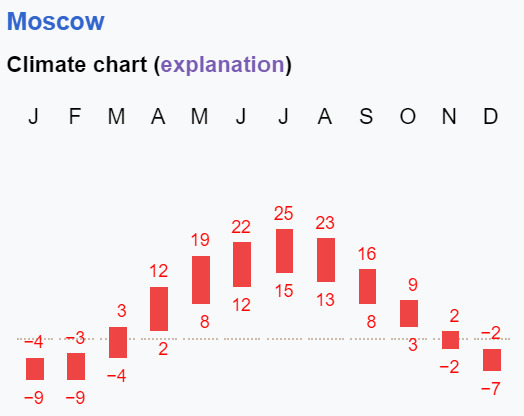
The temperature changes quite a lot throughout the year. Note that the maximum temperatures (summer) will occur at the opposite times of the year in the Southern Hemisphere.
You can see this demonstrated in Copiapo (Chile):

This city is in the Southern hemisphere, so their coldest months are June and July :)
One thing you may have noticed is that the bars here are taller, which means that the variation for the daily min and max are higher too. Why is that? I'm simplifying it a bit, but generally, the dryer a place is, the more variation you will get in daily temperature. Which brings us to the next thing to consider:
Humidity/Precipitation
There are a few things to consider:
Rainfall. This can vary month-by-month, and due to some complicated factors, some countries have more rain in their colder months, some have more rain in their warmer months. Some places don't follow a neat pattern or stay consistent throughout the year. Have a look at climate pages on Wikipedia to get some ideas! Even just this page on Chile has a lot of cool examples. Each city is quite different!
Although of course the "wetness" of a country related to rainfall (e.g. you'd expect greener grass somewhere with more rainfall, brownish dry grass or a desert somewhere with less rainfall), it's not that simple. UK is a wet country, right? And if you've heard of Gold Coast (Australia) it seems pretty dry, right? Well, actually the Gold Coast gets twice as much precipitation (rain) as London!
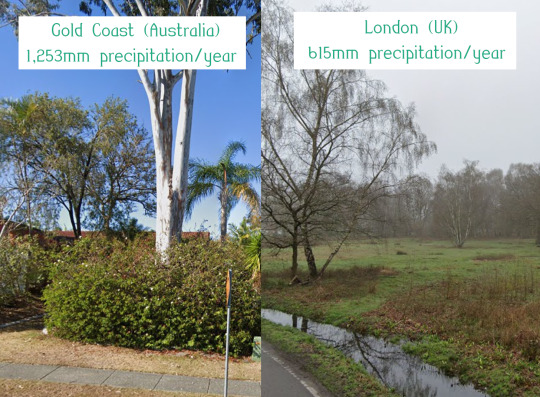
To demonstrate, I took a screenshot (randomly selected street in each city) from Google Streetview.
Why this difference? I suspect it's because the Gold Coast is much hotter. Living in Australia, puddles are normally gone by the next day (often the rain even evaporates as it hits the ground!), but in UK, the puddles would always stay around for a while.
The UK is always mossy, often the clouds hang in the sky for ages. It can look quite grey. When it rains in the Gold Coast in summer, the raindrops evaporate as soon as they hit the pavement, which makes the air feel very humid and smell strongly of rain. You can use these sorts of sensory details in your stories :)
Also, one thing I noticed, is that in hotter weather, rain can be much more heavy than in colder weather. In Australia we often get heavy rain that causes flooding. In UK the rain usually dribbles all day but doesn't get heavy. In a place like the Gold Coast you can get rain that last 10 minutes but soaks you all the way through and floods the street.
The rainfall may also vary year-by-year. Australia goes through periods of floods and droughts that last a couple of years. The mechanism is a bit complicated so I won't go through it now, but it gives you something to google!
Humidity: Deserts have low humidity, which means that you can cool off more easily in the shade and the nights are colder. The breeze feels more refreshing at low humidity as your sweat evaporates.
High humidity (like Singapore) will feel much hotter at the same temperatures and it is normally still quite hot in the shade. High humidity feels really muggy, the air feels thick. The sweat doesn't evaporate as much, so you are left all wet and sticky. The breeze can feel much less refreshing because of this.
When the temperature is below freezing, the humidity gets very low, so your skin may need more moisturiser or your lips may crack.
Those are just some things to consider while describing your weather!
Generally, closer to the sea will be wetter, further inland is dryer. Have a look at some climate maps on Wikipedia, you will learn a lot! Climate is quite complicated since there are so many factors, so there's a lot you can do with it.
UV: This is one thing that people often forget about when they think about weather. In the UK, even on a very hot and sunny day, you are unlikely to get sunburnt (unless you are very pale). In Australia, you can get sunburnt very easily in even Tasmania, which is our coldest state, even when the temperatures are chilly.
You can't actually feel being sunburnt, which I fully understood when I visited Tasmania. I was freezing, but the whole time I was being sunburnt.
Normally, UV index is higher closer to the equator, which is why people who live closer to the equator tend to have darker skin. The melanin acts as protection against the sun. Still, this protection isn't perfect, so in the real world people in Africa used different methods to protect their skin, such as using clay as a "sunscreen".
Australia has the highest rate of skin cancer in the world. This is partially because most people in Australia have pale skin (originally from the UK), but the UV index is high.
This is something to consider in your story, since it can play a bigger role in behaviour than you'd expect if you live in a cold climate. In Australia, they recommend staying indoors between certain hours of the day to avoid sunburn, and if you do go out you should wear clothes that cover your skin, a wide-brimmed hat and sunscreen. Someone with very pale skin can get sunburnt in minutes. Wide-brimmed hats are compulsory at schools in Australia - you are not allowed to play if you forget your hat.
In low-UV areas, there is the opposite issue. People with darker skin can have problems getting vitamin D. Same goes for people who cover their skin with clothing (e.g. for religious reasons). However, this is a bit simpler to fix with some vitamin D supplements.
How do I use this for worldbuilding?
If you have a map of your countries, you may want to keep their location in mind when deciding on the climate :)
I like to draw up some graphs with the temperatures throughout the year for each country and some quick notes on the humidity, rainfall and UV.
You can also add some other elements to your story. Is it a fantasy? Maybe magic affects the weather! Sci-fi? You can play with the distance of the planet from the sun, axial tilt, sun size etc. (I won't go into that since it's a whole another topic and really complicated as well)
You probably don't need to know the exact details of the climate for most stories, but having a general idea will allow you to consistently describe what sorts of clothing your characters wear, the weather etc. Those are the sorts of things that comes up in almost every story (if it's long enough).
If you read this and found this useful, please reblog so I know that it was helpful. If it seems like people enjoyed this post, I will make more (I was going to talk about so much more, but this is already too long).
201 notes
·
View notes
Text
Let's talk about fight scenes.
Writing fight scenes requires a delicate balance of action, emotion, and detail to keep readers engaged and immersed in the moment.
Here are some tips to craft compelling fight scenes:
Know your characters: Understand their fighting styles, strengths, and weaknesses—are they offensive, or defensive? Spontaneous, or strategic? Trigger-happy, or reluctant? Their personalities and motivations will influence their actions and decisions during the fight.
Create tension: Build tension leading up to the fight to increase the stakes and make the action more gripping. Foreshadowing, verbal sparring, or physical intimidation can all contribute to a sense of anticipation.
Use sensory details: Engage the reader's senses by describing the sights, sounds, smells, and physical sensations of the fight. This helps to create a vivid and immersive experience—but make sure not to overdo it. Too much detail can distract from the adrenaline of the fight.
Maintain clarity: Ensure that the action is easy to follow by using clear and concise language. Avoid overly complicated sentences or excessive description that could confuse readers.
Focus on emotions: Show the emotional impact of the fight on your characters. Describe their fear, anger, determination, or adrenaline rush to make the scene more compelling and relatable.
Include strategic elements: Incorporate tactics, strategy, and improvisation into the fight to make it more dynamic and realistic. Think about how your characters use their surroundings, weapons, or special abilities to gain an advantage.
Balance dialogue and action: Intersperse dialogue with action to break up the fight scene and provide insight into the characters' thoughts and intentions. Dialogue can also reveal or support the characters' personalities and motivations.
Keep it concise: While it's important to provide enough detail to immerse readers in the action, avoid unnecessary padding or overly long fight scenes. Keep the pacing brisk to maintain momentum and keep readers hooked.
Show the consequences: Illustrate the aftermath of the fight, including injuries, emotional trauma, or changes in relationships between characters. This adds depth to the scene and helps to drive the story forward.
Hope this helped ❤
4K notes
·
View notes
Text
listen you lot
your girl here is about to complete formal education to become a freelance editor, and i have it on good authority that i’m pretty darn skilled.
there are a ton of oc writers floating around in the fanfic community, and you’re my people, so i put it to you:
what do YOU need from an editor? what would make you more inclined to hire someone?
In exchange, please enjoy this entirely accurate hot tip from Merriam-Webster:

P.S., I’ll be posting writing and editing stuff on my pen name account, @becoming-a-fox.
20 notes
·
View notes
Text
How to come up with a story based on vibes that (probably) doesn't suck aka how to come up with a plot
First, identify the vibes. Maybe you already know. If so, great! If not, well that's what I'm here for. What are books/movies/shows that have what you're trying to achieve? A song or an image? Come up with a list of as many things.
YAY now you know what vibes you want.
Then you are going to make a list about the things (or your favorites if you have too many). Look at themes, characters, genres, settings, style, etc. If you have no idea where to start, pull up their wikipedia pages and read them. Anything similar WRITE IT DOWN (you will forget, don’t lie).
Take that list and find your favorite/most common things. These will be what gives you your vibe.
Take this list and invent a little guy who lives in this list. YAY now you have a character. What does this guy want?
It wants to live.
Now look at me. No. Look at me in the eyes. Stare into my soul.
You’re gonna let him live.
Use your vibe list to create a little world. Do you mostly like horror/mystery? BAM this guy lives in a horror/mystery. Do you mostly like historical fiction? BAM this guy lives in the past. Do you like dystopian things? BAM this guy lives in a dystopian world. Do this with whatever genre you want.
Now what does this guy in this world want most?
And how are you going to do everything in your power to stop him?
44 notes
·
View notes
Text
The Hero with Dead Parents is not Cliché, it’s Necessary
The staggering number of protagonists in sci-fi and fantasy with dead parents grows every single year. Frodo Baggins, Harry Potter, Luke Skywalker (before the retcon in ESB), almost every Disney Prince and Princess, the Baudelaire children. Beyond the realm of fantasy into action, thriller, romance, mystery, slice-of-life, and bildungsromans.
Dead parents, or parent, is the curse of being the hero of the story and for a very good reason:
Parents are inconvenient as f*ck.
Unless the mom and/or dad is the villain of the story or the entire story is about the relationship with the parent/parents, the “dead parent” trope serves many purposes and while it may be “cliché” that doesn’t mean this trope is bad or, in my opinion, overused.
It’s one less liability the hero has to worry about protecting
It’s one less obstacle in the hero’s path to their adventure
It’s one (or two) less characters to find excuses to stay relevant in the story
It’s a juicy backstory a lot of people can relate to
Trauma. Is. Compelling.
It’s an excellent motivation
And their murder is an excellent inciting incident
Living parents and guardians get killed off both for internal plot reasons, and meta writing reasons: Living parents are a pain in the ass to keep up with. You’re stuck with a character your hero should still keep caring about, keep thinking about, keep acting in relation to how their actions will be seen and judged by that parent. That parent becomes an obvious liability by any villain who notices or cares.
Living parents can of course be done well, unless they’re the villain, but they just kind of sit there on the fringes of the plot, waiting around to be relevant again and they kind of come in four flavors:
There when the plot demands for pie and forehead kisses (Sally from Percy Jackson)
A suffocating but well-meaning obstacle in between the character and their independence trying to do right (Abby from The 100, Katniss’ mom from Hunger Games, Spirit from Soul Eater)
A mentor figure (Valka from HTTYD 2, Hakoda from ATLA)
The only rock this character has left (Ping from Kung Fu Panda)
*Notice how many of my examples lost their partners shortly before or during the plot, thus still giving the hero the “dead parent” label.
Most of these are self-explanatory so I’ll say this: I think this trope gets exhausting when the parents are written out without enough emotional impact on the hero. These are their parents and a lot of the time, the emotional toll of losing them isn’t there, like just slapping a “dead parents” sticker is all you need to justify a character’s tragic backstory and any behavioral issues they might have.
Like, yes, the hero has dead parents, but you still have to tell me what that means to them beyond obligate angst and sadness. When the “dead parents” trope reads as very by-the-numbers, usually the rest of the story is, too.
How present the parents were in the character’s life should be proportional to the death’s impact on the narrative (as with any character you kill off). If they were virtually nonexistent? No need to waste a ton of time. If they didn’t matter to the character before, they don’t need to matter now unless the plot revolves around some knowledge or secret their parent never shared.
Sometimes, the hero’s dead parents are a non issue. Frodo being raised by Bilbo doesn’t impact his character at all. It’s a detail given and tossed away. On the other hand, sometimes the entire centerpiece of the work is revenge/justice/catharsis surrounding the parent’s death—Edward and Alphonse Elric’s entire story is defined by the consequences of trying to bring their mother back from the dead.
As someone who kept one of my protagonist’s parents alive and didn’t make them villains just to spite the trope, I have all the more respect for this enduring legacy of fiction.
You can of course keep the parents alive, but I don't think it's seen as lazy or cheating or taking a shortcut just killing them off, so long as you remember that your hero is human and should react to losing them like a real person.
170 notes
·
View notes


